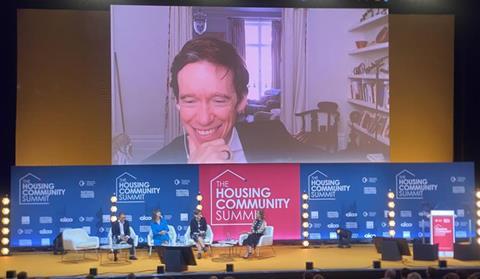Panel members discuss the former secretary of state’s departure from government at the Housing Community Summit 2025
Angela Rayner’s passion for social housing has been commended by the chief executive of the National Housing Federation (NHF).

Speaking at the Housing Community Summit in Liverpool yesterday days after Rayner’s resignation, Kate Henderson said: “I’ve been working with secretaries of state for housing for the last 20 years, and many of which are passionate about social housing, but not quite in the same way that Angela went out to bat for the sector.
“And I think we saw that with the spending review in terms of how late we settled as a department. She negotiated super hard, and we got a £39bn programme as a result of it.”
The panel discussed the political landscape after June’s spending review, including the feasibility of the government’s £39bn capital programme for social and affordable housing over a ten-year period.
When asked whether the commitment to social housing can be largely credited to the former secretary of state, Henderson responded: “The government’s economic fortunes are so dependent on having a vibrant construction sector, and housing is a fast route to infrastructure delivery, and social and affordable housing does prop up.
“We are part of the housing and construction ecosystem, so I think there’s a huge amount of passion and leadership from Angela Rayner. But I think the prioritisation of housing - the one and a half million homes target - is core to this government.”
Also on the panel was Rory Stewart, former secretary of state for international development, who was concerned that the government’s targets may be sidelined by a potential constant reshuffling of the cabinet.
He said: “One problem that you’re going to face is the problem that you had with the conservatives, which is an endless shuffle of housing ministers, and the way in which, each time a new minister comes in, they reinvent the priorities again…
“In theory, there’s a 10-year plan in place. But my experience in government is that it’s pretty remarkable how a new secretary of state can change a great deal. We saw it, for example, where you had such a job in Gavin Barwell with a particular vision around housing, which was underwritten by prime ministers. And then Michael Gove came in and effectively reversed an enormous amount of stuff that they were trying to do.”
Stewart also pointed out that Labour’s decade-long housebuilding plan could be derailed if it is beaten out by the Reform party in the 2029 general election.
He said: “There’s certainly a lot of evidence from the Reform councils that are beginning to emerge that they are a little bit impatient with biodiversity and climate arguments about planning on the one hand.
“On the other hand, they can unpredictably support community objection to building.”
While Stewart said this contradiction suggests that Reform’s attitude to construction is “partly to do with which constituencies they win”, he claims that Reform voters are “interested in affordable housing”, evidenced by recent polls, “so there’s not a huge digression in terms of the voter base.”
More from the Housing Community Summit
NHF warns it can’t support MHCLG’s mandatory floor coverings proposal unless extra funding provided
Homes England recruiting regional chief executives in devolution drive
Housing Community Summit: all our coverage in one place
Rent increases should be linked to energy efficiency of homes, Housing Community Summit hears
MP warns sector not to use delays as reason to row back on building safety reforms
Sector needs ‘short-term solution’ to labour shortages, says Abri CEO











No comments yet